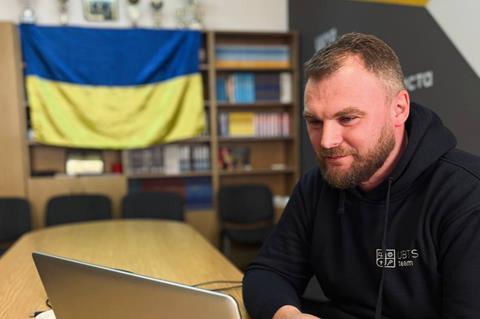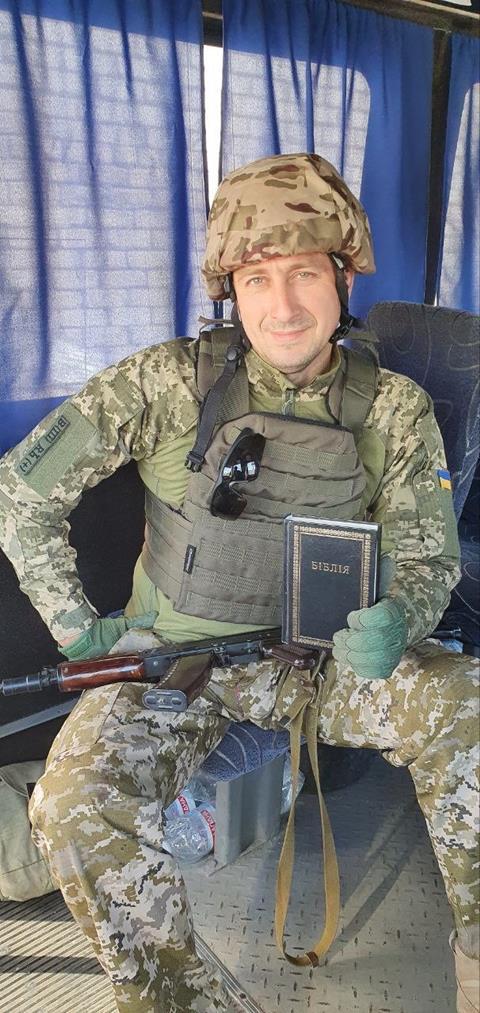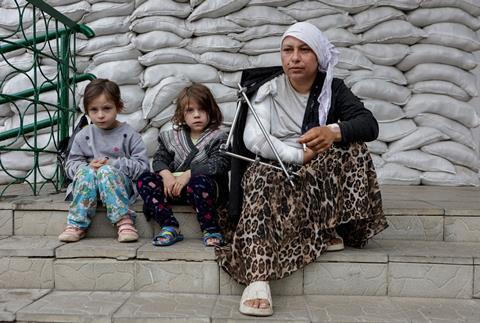The Russian invasion is still wreaking a heavy toll, and the need is great, says Ukrainian church leader David Karcha. He reports on how his church is seeing God move powerfully, even amid the chaos of war

February 24 2022 is carved into my memory - the day Russia’s full-scale invasion began. The day fear swept across Ukraine like a flood. Each morning started with the same questions: When will they strike next? How far will they go? Will we survive this?
Those first weeks felt like living inside a nightmare that wouldn’t end. Sirens became the soundtrack of our days. Every phone call carried a cry for help. We learned to run, to hide, to help. We learned to count the seconds between explosions, to enjoy even the smallest things, to cherish what we had. We learned how fragile life is.
Then came 2023 and 2024 - years filled with even more cruelty and pain brought by the Russian army. But we kept going, helping as much as we could, holding on to hope and longing for peace. But those years have blurred together. The hope that once carried us through the first year has slowly drained away.
We are still serving. Still praying. Still believing that Christ, who walked out of the grave, is not finished with Ukraine.
Looking back now, if 2022 was terrifying, 2025 is heartbreaking. Four years in, the shock has faded, but not the suffering. What remains is a stubborn endurance - an unbreakable resistance and a relentless weariness. This is no longer about surviving one day of fear; it’s about enduring the long, heavy weight of years.
And yet, even in the midst of exhaustion, life and faith keep breaking through. Hope shows up in the smallest, most unexpected places - fragile, but unshaken.

Here in Lviv, a city in western Ukraine, we have what we call ‘refugee towns’ - long rows of shipping containers lined up like makeshift streets. They’re fitted with electricity, heating, beds and small kitchens. Thousands live in these spaces: people who have lost everything and simply cannot afford to start over.
If you walk through these towns, you’ll see elderly women sitting on benches, talking about the homes they’ll never return to. You’ll see children - some born during the war - playing and laughing, but who know nothing of peace.
Alina was born in Donetsk in 2022. She is four years old. She came here with her mother and grandmother. To her, sirens are as ordinary as rain. Her friend Dima flinches at every loud noise - even passing trucks. Their fathers are gone.
Their world is shaped by pain and absence.They cannot compare war to peace - they’ve only known this. If nothing changes, the abnormal will become normal. That’s what’s most dangerous. Their story reflects a grim statistic: according to a recent UN/UNICEF report, 70 per cent of Ukraine’s children — about 3.5 million — lack access to basics such such as food, shelter or clean water.
The need is overwhelming. But this is exactly where the Church is called to be — not above the suffering, but among it.
Serving the soldiers
Since day one of the invasion, our church — like many across Ukraine — has stood with those who suffer most. At first, we gave shelter and food to the flood of refugees. Now, we walk quietly alongside those who have stayed. Many cannot leave. They have nowhere to go. And so we work to make life liveable again: helping children find friends, providing basic help, creating safe spaces for play, music and sport. It’s not glamorous, but it is faithful.
We also serve soldiers: not only in trenches, sharing the Lord’s Supper, but also in the hospital rooms where they recover, often alone. We visit, bring meals, sit in silence and pray. We remind them: you are not forgotten. You are not alone.

One of these soldiers is Olexander. In 2022, he was a fourth-year student at the Ukrainian Baptist Theological Seminary — a 44-year-old minister-in-training from the Kyiv region, preparing to serve the Church, not the army. But when his city called for defenders, he went. At first, he dug trenches. Then he organised logistics and fortified positions. Eventually, he joined a combat unit on the eastern front.
For two years, Olexander fought near Donetsk region. Twice he was trapped behind enemy lines - once for 20 days. Each time, the church prayed. Students prayed. Friends prayed. And each time, he miraculously returned alive.
But this time it is different.
As I write this, Olexander is in the hospital, gravely wounded. He has lost both legs. We do not know if he will live. But we pray - because prayer here is not routine. It is an act of love. When we say “we are praying”, we mean: we are still loving and still trusting God.
We also pray for the grieving. The widows we serve often live in suspended time, caught between hope and heartbreak. Some know their husbands are gone. Others wait in silence, torn between longing and dread. Our calling is to step into that silence with the only true hope we have - not in ourselves, but in the risen Christ.
Where is God?
You might ask, where is God in all of this? He is where he has always been: with the broken, moving through his people - often in ways we don’t see until much later.
This war has torn apart homes, families, and futures. According to Ukraine’s Ministry of Defence, more than 180,000 soldiers and civilians have been killed or wounded. It has brought even the strongest to their knees.

And yet amid the rubble, something sacred is stirring. The Holy Spirit is filling ordinary believers with extraordinary grace. Through their pain, they are carrying light into places where no light should reach.
They don’t stand on stages or write books. They open their homes, share meals, pray with soldiers and sit with widows. Their names won’t make the news, but their faith echoes in eternity.
We see God in these quiet acts of mercy. We see him in men and women who choose compassion over convenience - who resist the urge to turn inward, and instead open their lives and say: “Come in. You are not alone.”
We see him in the church. People who once hesitated to enter an evangelical church now walk through our doors, searching for truth, healing and hope. And they meet Jesus.
In the past three years, we’ve witnessed more baptisms than in the previous 15. Not because of programs or strategy, but because war has stripped away the illusion of control. And into that raw emptiness, Christ whispers: “I am still here. I am still calling you.”
Even on the battlefield, we hear stories of soldiers surviving against all odds. Some call it luck. Others call it grace. Maybe every breath is a miracle when someone dares to believe again.
That kind of faith doesn’t just survive - it holds others together.
How to help
Before the war, I watched suffering on the evening news and felt sympathy. But it was distant. Brief. Just another headline. Now I know what it means to live inside the headline.
And I’ve learned this: comfort, if left unchecked, can dull compassion. The more insulated we are, the easier it becomes to see someone else’s suffering as far away, or less real.
But what if this moment - this war - is God’s invitation to widen your reach? You don’t have to travel to Ukraine to make a difference. You can start where you are:
• Pray - not as routine, but as a declaration of love. Adopt a church, a family, a soldier like Olexander. Let them shape your prayers and soften your heart.
• Connect - reach out to ministries on the ground. Ask what they need. Ask how they’re holding up. Remind them: you are not forgotten.
• Give - faithfully, generously, even if it seems small. Many churches here live month to month on donations. Your consistency sustains them.
• Send - some churches in Europe send volunteers to run camps, teach English or offer trauma care. These moments change lives, both here and there.
And here’s the hidden beauty: the one who gives is often transformed alongside the one who receives.
You might think your life is too ‘normal’ to matter. But in a world torn by war, normal is powerful. It is healing. It is hope. When you share it - through presence, prayer or partnership - you extend the Kingdom of God into places where darkness thought it had won. And that is no small thing.
Children here still flinch at thunder. But they also chase butterflies between the rows of containers, laughing as if the sky were whole again. Their joy is fragile, but it is real. It reminds me: hope is not the absence of sorrow. It is the refusal to let sorrow have the final word.
Four years into this war, we are tired, but we have not lost our faith. We are still serving. Still praying. Still believing that Christ, who stepped into history’s darkest hour and walked out of the grave, is not finished with Ukraine.
We may not know how or when this war will end, but we know the One who holds the ending, and we share this good news with everyone around us. Until that day comes, we will keep moving forward - tired, yes, but never defeated.



































1 Reader's comment